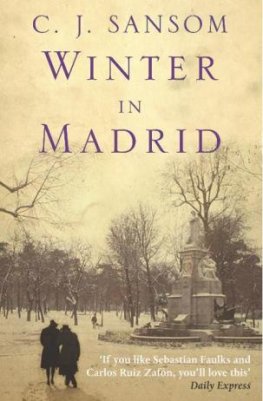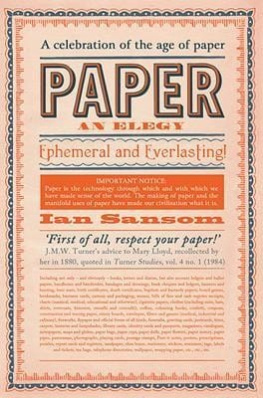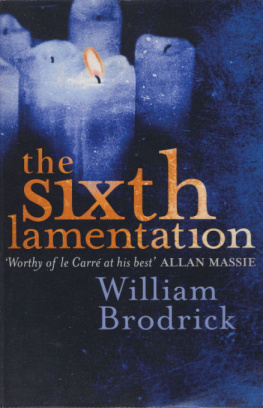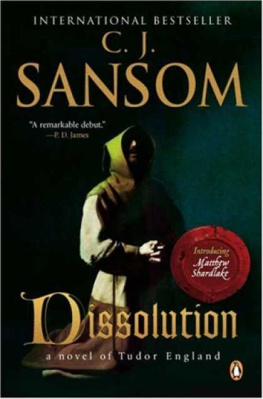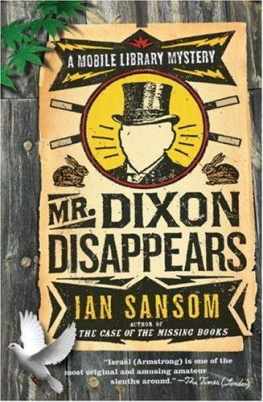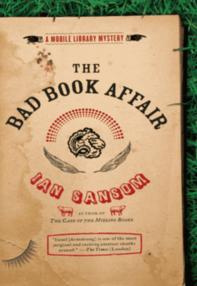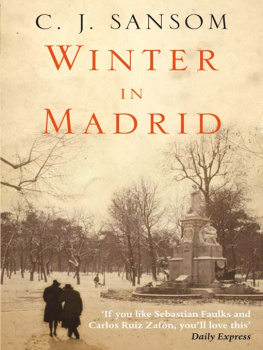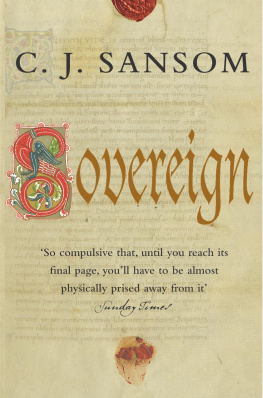C. Sansom - Lamentation
Here you can read online C. Sansom - Lamentation full text of the book (entire story) in english for free. Download pdf and epub, get meaning, cover and reviews about this ebook. year: 2014, publisher: Pan Macmillan, genre: Detective and thriller. Description of the work, (preface) as well as reviews are available. Best literature library LitArk.com created for fans of good reading and offers a wide selection of genres:
Romance novel
Science fiction
Adventure
Detective
Science
History
Home and family
Prose
Art
Politics
Computer
Non-fiction
Religion
Business
Children
Humor
Choose a favorite category and find really read worthwhile books. Enjoy immersion in the world of imagination, feel the emotions of the characters or learn something new for yourself, make an fascinating discovery.
- Book:Lamentation
- Author:
- Publisher:Pan Macmillan
- Genre:
- Year:2014
- ISBN:9780230761292
- Rating:4 / 5
- Favourites:Add to favourites
- Your mark:
- 80
- 1
- 2
- 3
- 4
- 5
Lamentation: summary, description and annotation
We offer to read an annotation, description, summary or preface (depends on what the author of the book "Lamentation" wrote himself). If you haven't found the necessary information about the book — write in the comments, we will try to find it.
Lamentation — read online for free the complete book (whole text) full work
Below is the text of the book, divided by pages. System saving the place of the last page read, allows you to conveniently read the book "Lamentation" online for free, without having to search again every time where you left off. Put a bookmark, and you can go to the page where you finished reading at any time.
Font size:
Interval:
Bookmark:
C. J. Sansom
Lamentation
Chapter One
I did not want to attend the burning. I have never liked even such things as the bearbaiting, and this was to be the burning alive at the stake of four living people, one a woman, for denying that the body and blood of Christ were present in the Host at Mass. Such was the pitch we had come to in England during the great heresy hunt of 1546.
I had been called from my chambers at Lincolns Inn to see the Treasurer, Master Rowland. Despite my status as a serjeant, the most senior of barristers, Master Rowland disliked me. I think his pride had never recovered from the time three years before when I had been justly disrespectful to him. I crossed the Inn Square, the red brickwork mellow in the summer sunshine, exchanging greetings with other black-gowned lawyers going to and fro. I looked up at Stephen Bealknaps rooms; he was my old foe both in and out of court. The shutters at his windows were closed. He had been ill since early in the year and had not been seen outside for many weeks. Some said he was near death.
I went to the Treasurers offices and knocked at his door. A sharp voice bade me enter. Rowland sat behind his desk in his spacious room, the walls lined with shelves of heavy legal books, a display of his status. He was old, past sixty, rail-thin but hard as oak, with a narrow, seamed, frowning face. He sported a white beard, grown long and forked in the current fashion, carefully combed and reaching halfway down his silken doublet. As I came in he looked up from cutting a new nib for his goose-feather quill. His fingers, like mine, were stained black from years of working with ink.
God give you good morrow, Serjeant Shardlake, he said in his sharp voice. He put down the knife.
I bowed. And you, Master Treasurer.
He waved me to a stool and looked at me sternly.
Your business goes well? he asked. Many cases listed for the Michaelmas term?
A good enough number, sir.
I hear you no longer get work from the Queens solicitor. He spoke casually. Not for this year past.
I have plenty of other cases, sir. And my work at Common Pleas keeps me busy.
He inclined his head. I hear some of Queen Catherines officials have been questioned by the Privy Council. For heretical opinions.
So rumour says. But so many have been interrogated these last few months.
I have seen you more frequently at Mass at the Inn church recently. Rowland smiled sardonically. Showing good conformity? A wise policy in these whirling days. Attend church, avoid the babble of controversy, follow the Kings wishes.
Indeed, sir.
He took his sharpened quill and spat to soften it, then rubbed it on a cloth. He looked up at me with a new keenness. You have heard that Mistress Anne Askew is sentenced to burn with three others a week on Friday? The sixteenth of July?
It is the talk of London. Some say she was tortured in the Tower after her sentence. A strange thing.
Rowland shrugged. Street gossip. But the woman made a sensation at the wrong time. Abandoning her husband and coming to London to preach opinions clear contrary to the Act of Six Articles. Refusing to recant, arguing in public with her judges. He shook his head, then leaned forward. The burning is to be a great spectacle. There has been nothing like it for years. The King wants it to be seen where heresy leads. Half the Privy Council will be there.
Not the King? There had been rumours he might attend.
No.
I remembered Henry had been seriously ill in the spring; he had hardly been seen since.
His majesty wants representatives from all the London guilds. Rowland paused. And the Inns of Court. I have decided you should go to represent Lincolns Inn.
I stared at him. Me, sir?
You take on fewer social and ceremonial duties than you should, given your rank, Serjeant Shardlake. No one seems willing to volunteer for this, so I have had to decide. I think it time you took your turn.
I sighed. I know I have been lax in such duties. I will do more, if you wish. I took a deep breath. But not this, I would ask you. It will be a horrible thing. I have never seen a burning, and do not wish to.
Rowland waved a hand dismissively. You are too squeamish. Strange in a farmers son. You have seen executions, I know that. Lord Cromwell had you attend Anne Boleyns beheading when you worked for him.
That was bad. This will be worse.
He tapped a paper on his desk. This is the request for me to send someone to attend. Signed by the Kings secretary, Paget himself. I must despatch the name to him tonight. I am sorry, Serjeant, but I have decided you will go. He rose, indicating the interview was over. I stood and bowed again. Thank you for offering to become more involved with the Inns duties, Rowland said, his voice smooth once more. I will see what other he hesitated activities may be coming up.
On the day of the burning I woke early. It was set for midday but I felt in too heavy and mopish a frame of mind to go into chambers. Punctual as ever, my new steward Martin Brocket brought linen cloths and a ewer of hot water to my bedroom at seven, and after bidding me good morning laid out my shirt, doublet and summer robe. As ever, his manner was serious, quiet, deferential. Since he and his wife Agnes had come to me in the winter my household had been run like clockwork. Through the half-open door I could hear Agnes asking the boy Timothy to be sure and fetch some fresh water later, and the girl Josephine to hurry with her breakfast that my table might be made ready. Her tone was light, friendly.
Another fine day, sir, Martin ventured. He was in his forties, with thinning fair hair and bland, unremarkable features.
I had told none of my household about my attendance at the burning. It is, Martin, I replied. I think I shall work in my study this morning, go in this afternoon.
Very good, sir. Your breakfast will be ready shortly. He bowed and went out.
I got up, wincing at a spasm in my back. Fortunately I had fewer of those now, as I followed my doctor friend Guys exercises faithfully. I wished I could feel comfortable with Martin, yet although I liked his wife there was something in his cool, stiff formality that I had never felt easy with. As I washed my face and donned a clean linen shirt scented with rosemary, I chid myself for my unreasonableness: as the master it was for me to initiate a less formal relationship.
I examined my face in the steel mirror. More lines, I thought. I had turned forty-four that spring. A lined face, greying hair and a hunched back. As there was such a fashion for beards now my assistant Barak had recently grown a neat brown one I had tried a short beard myself a couple of months before, but like my hair it had come out streaked with grey, which I thought unbecoming.
I looked out from the mullioned window onto my garden, where I had allowed Agnes to install some beehives and cultivate a herb garden. They improved its look, and the herbs were sweet-smelling as well as useful. The birds were singing and the bees buzzed round the flowers, everything bright and colourful. What a day for a young woman and three men to die horribly.
My eye turned to a letter on my bedside table. It was from Antwerp, in the Spanish Netherlands, where my nineteen-year-old ward, Hugh Curteys, lived, working for the English merchants there. Hugh was happy now. Originally planning to study in Germany, Hugh had instead stayed in Antwerp and found an unexpected interest in the clothing trade, especially the finding and assessing of rare silks and new fabrics, such as the cotton that was coming in from the New World. Hughs letters were full of pleasure in work, and in the intellectual and social freedom of the great city; the fairs, debates and readings at the Chambers of Rhetoric. Although Antwerp was part of the Holy Roman Empire, the Catholic Emperor Charles V did not interfere with the many Protestants who lived there he did not dare imperil the Flanders banking trade, which financed his wars.
Font size:
Interval:
Bookmark:
Similar books «Lamentation»
Look at similar books to Lamentation. We have selected literature similar in name and meaning in the hope of providing readers with more options to find new, interesting, not yet read works.
Discussion, reviews of the book Lamentation and just readers' own opinions. Leave your comments, write what you think about the work, its meaning or the main characters. Specify what exactly you liked and what you didn't like, and why you think so.


